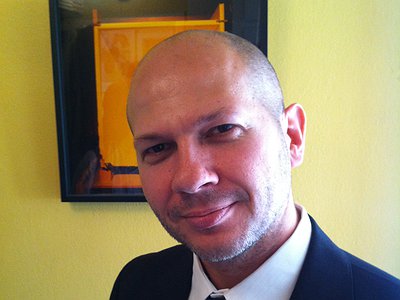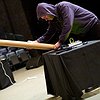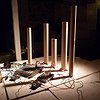Some people see recording improvised music as a problem. Do you?
Not at all.
In the 20th century, the relationship between music and other forms of art – painting, video art and cinema most importantly - has become increasingly important. How do you see this relationship yourself and in how far, do you feel, does music relate to other senses than hearing alone?
In my own experience to observe other art disciplines, philosophy, literature, and science helps to understand perception, and existence, in a deeper way. I’m not interested in combining arts so much as digging into perception, in a technical conceptual and poetic way (of sound, space, time), and in perception of life itself.
The combination often can be monumentalist and pretentious, but can be beautiful if we find the right spot where it is necessary to combine the gesture. I think more in cases where the disciplines become transparent and allow each other in an elegant way. Or the case of someone like László Moholy Nagy that suggested art as education, as a development of the best of us, allowing himself not to be imprisoned in an obsessed way in one discipline.
Many artists have impressed me deeply taking me to perceive life and to play music in a different way. Each of them in a different and specific way. Several visual artists that interest me work with the way that our body behaves in the space, and our senses react to lack of light, as well as other aspects like how our eyes can respond to the phenomenon of colour treated in specific ways that trick the organ, like Robert Irwin, James Turrell, Bruce Nauman. This deeply interests me, in similar ways, but regarding sound.
I think in a similar way regarding the way that cinema directors like Andrei Tarkovsky, Sergei Paradjanov, Robert Bresson and more recently Apichatpong Weerasethakul, work aspects like time, light and the perception of their own spaces. The way Weerasethakul films the forest, how it sounds in his movies, how he perceives the space of a public hospital and its sounds in the movie called Syndromes and a Century is wonderful, for example. The same I can say about the way Tarkovsky works time and light, how Bresson works the expression, the place that a story (that stands alone, but is not actually the main aspect of the film), have in his films, the way Paradjanov searches in the unconscious and transmits it in a poetic, beautiful way.
What is clear to me is that I love doing music, even when I take a concept or an impression that comes from another discipline, I preserve myself into the music production. I think that visual and conceptual arts are overvalued in contrast with music on an intellectual level. But that is not so true in everyday life. In my case I think that it becomes very rich for me to observe those disciplines and to work specific aspects in music.
In how much, do you feel, are creative decisions shaped by cultural differences – and in how much, vice versa, is the perception of sound influenced by cultural differences?
Sound does not behave equally in every place because it is produced by different elements, resonates in different spaces and is listened by ears formed in those spaces that listen to vibrations produced by those objects in those spaces. So, even if the sound phenomenon is the same physically, these elements determine in a certain degree the way you create and the way you listen.
This is a basic aspect, there are may aspects in common, though. These common aspects of sound have been always there, and are intriguing. It is actually a mystery, how people so different (apparently) can do music that can mean so much to me. And sounds that are so different to the ones that I produce, can sound so familiar, or even when they do not sound familiar sound so fresh and impact on me in such a natural beautiful way. Both the different and the common aspects are for me an invitation to share sound, with people.
I tend to find a bit strange the idea of cultural difference. It was very important and very useful, after centuries of people killing each other to establish the idea of cultural difference, in order to make relative our own values, and then to be more open to share and change opinions. But the same aspect is being used too often to separate people, used to allow people or not to get in or to oblige to stay out, to accept or not. Fixing a higher value to certain aesthetics, that come from specific places and human groups. We are not free of our own origins and history, but this is a gift and not a limit for me. I see human beings like me, here and there. We are talking about the same thing. I want to listen to everybody as an equal, the differences that we have make us equal agents of beauty sharing, and not the contrary.
To expect someone’s work to be totally different because this person comes from a far away land, focuses the experience on your expectations, and creates limits to the possibility of listening and communicating. To expect this person to sound like your pairs and yourself sound like, is an expression of the same behaviour. The difference exists but it's an expression of equality, we are all different, and because of that, the same. This is the way I try to listen to others and offer my work.
Do you feel it important that an audience is able to deduct the processes and ideas behind a work purely on the basis of the music? If so, how do you make them transparent?
In my own work I try to let the music stand alone, without needing an explanation. Some artist’s work is related to concepts and these concepts have to be explicit, when it's necessary. Of course when the concept is not to expose it, that’s not necessary. Very recently I explained to the audience, just speaking, how I had done a certain work. It was related to spectralism, and I felt necessary to speak about it, as an invitation to listen, to participate of that specific experience.
It has happened to me to change over the years, my approach to the use of preparations in my instruments. Initially I tried to be creative. Then I began to refuse that idea radically, finding that creativity cliché. Very often, that method did not offer really interesting music, but just a “creative “ approach to the instrument playing, what is not creative as a starting point itself, at least for me nowadays.
Then I began to think that a way to include the external space, the every day space in my music was to use those objects. The difference was subtle but real, I truly think that I began to play better since then. Because I did not care anymore about the interesting idea, but on the concept, that was more basic, but more rich. And in the main aspect of this, that is the quality of the music that you offer.
It also happened to me to feel that people who are not a usual audience of this music relate in a familiar way to the music when they see familiar objects. I am not underestimating their capacity to perceive music saying this. But I’m being realistic thinking that people who do not have the habit of listening to a certain way of sound production can stay out of the situation. I do not place an object with the intention of being readable in an easier way. But I have appreciated this phenomenon and I welcome it.
Another important aspect that I found was related to concentration. It's not possible for anyone to be always concentrated in a delicate and tense concert. I found out that audiences always, even experienced ones, in certain moments (not always at the same time) think about something else. To use one or two objects, or another kind of subtle gesture, can bring the concentration to the music. Someone told me once that it could be distracting, but I like to think that I can chose the distraction, when, and how if I use a few elements properly.
Usually, it is considered that it is the job of the artist to win over an audience. But listening is also an active, rather than just a passive process. How do you see the role of the listener in the musical communication process?
It is an active role, but there is not an equal responsibility. Thanks to the Situationist's liberating ideas, we tend to redefine the audience and open their responsibility to our work. But we have to be careful, the one that is on stage is me, and I have to offer something important to the people that came to listen to me. People make an effort and honour you by coming to listen to you. I prepare myself intensely for each concert, I really think a lot before each performance. I have the highest consideration for the listeners, and I offer the best of my work each time. This does not mean at all to adapt myself to their needs, but just to offer what I truly think is my best, even if I think that doing certain things can make the gig not the most successful one.
Honestly I think that it's not very difficult to satisfy expectations. Audiences are very divided, very specific, and behave in very predictable ways, very often.
It is not my intention to provoke or to challenge the audience. I try to make enjoyable music. But the real enjoyment is not to satisfy expectations. I think that is to produce enjoyment doing something out of it. Enjoyable but not in the determined sense. My last concerts were each quite different from each other. What is problematic in terms of diffusion of my work, because the information that is offered about your work here and there needs to be very precise and very clear in order to make the people that are interested in your work, know what it is about. I try to make it clear that the work is about certain concepts, certain approach to sound. It's not about certain techniques or styles that I have to repeat till I get bored in order to let as many people know as possible what my cliché technique is so it that distinguishes me from other musicians. The personality I think has to stay behind, hidden, not exposed through certain techniques, but present almost in an unconscious way. I have the same approach towards CD production.
Music-sharing sites and blogs as well as a flood of releases in general are presenting both listeners and artists with challenging questions. What's your view on the value of music today? In what way does the abundance of music change our perception of it?
I think that it's great in one aspect. I have found lots of gems through blogs. When I go to Argentina I find a lot more people informed about experimental music than when I left ten years ago. And is not about being more informed, is about being more free to do something that gives you pleasure. I only download things that cannot be bought anymore, I found gorgeous music that is out of print on several blogs. I think though, that we have to be very careful. There is a very strong tendency to get confused into over information, downloading a bunch of music and listening bad quality mp3s. That is a terrible aspect of it. Many young musicians are enjoying lots of different music, and this is great, but very often it looks to me that they are unable to enjoy their own sounds. There is too strong a tendency to the tribute these days, because of that. That is powered by the fetishist culture we live in. I really take care of what I check and download. Also regarding magazines and information. The real information happens when I go to my studio and play my instruments, when I play with people or alone for an audience, when I listen properly to an album. This just means that I try to limit the amount of information that arrives to me, and to dedicate proper time to it.
Please recommend two artists to our readers which you feel deserve their attention.
Radu Malfatti and Eliane Radigue.
Read and hear more Lucio Capece at luciocapece.blogspot.co.uk




